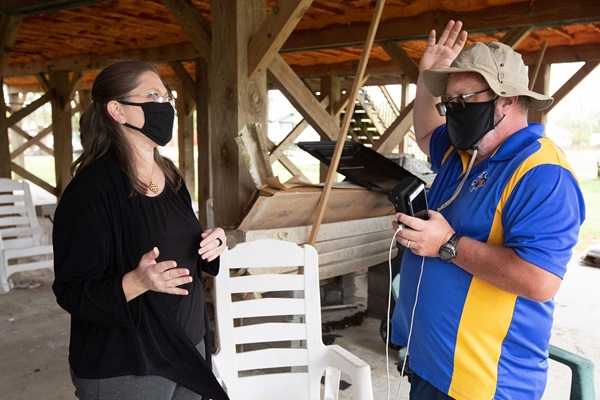Christmas is a season of presence. We long to be present, but often cannot. Being together gets messy during a pandemic, as it could lead to a proliferation of illness. It can be risky.
Through this lens, we view a reminder of the great love expressed by God through Jesus, whom Matthew tells us is Emmanuel: God with us (Matthew 1:22-23).
God entering into a human presence in the person of Jesus was a risky endeavor. Earth is messy. There is sickness and discord. People get hurt. It is risky to live here.
God’s human entrance into history is an object lesson in God’s desire to be part of our human experience. It displays the reach of God’s love for us—that God might come to us in our risky existence in order that we may know the depth of love. There is Jesus because you and I are desired by God.
Holy desire
For John Wesley, God’s desire for us inspired a holy desire within him. Wesley felt a zeal—or warmth—for sharing in God’s love. He wanted to desire the things of God in the way God desires to share love with us. This inspired in Wesley a set of “Holy Tempers,” a kind of roadmap for aligning our hearts with God’s, for expressing the love that God expresses for us in Christ Jesus.
Wesley used the term “Holy Tempers” without offering a clear definition. But in the context of his usage, tempers are likely akin to urges. They are the desires that provoke us to align our hearts to God’s. They stand in contrast to worldly tempers (or urges) like pride, covetousness, ambition and revenge.
It is not surprising that Wesley sought to organize the Holy Tempers, providing an order of priority. The order becomes a method for our pursuit of God. When we properly order our tempers, we orient our desires towards God. This ordering of tempers does not comprise a list, however. Instead, the order is a circle in which we move our way towards center.
Enthroned at the center or our holy tempers is love: “love sits upon the throne which is erected in the inmost soul; namely, love of God and man, which fills the whole heart, and reigns without a rival” (John Wesley’s sermon “On Zeal” sec 2, par 5).
In a circle around “the throne” are urges like humility, gentleness, meekness, temperance, longsuffering and fidelity. Works of mercy, like feeding the hungry and ending oppression; and works of piety, like reading scripture and sharing in the sacraments, encircle the holy urges.
This may appear a little convoluted in word form, but the order was important to Wesley: “This is the entire, connected system of Christianity: and thus the several parts of it rise one above another, from that lowest point, the assembling ourselves together, to the highest — love enthroned in the heart” (“On Zeal” sec 2, par 6). It is through the works of piety and mercy that we exercise and refine the holy tempers.
A beautiful inward and outward movement exists in this organization. When we are feeling gripped by the love of God, we will feel pulled to express that love in works of mercy. Conversely, when we engage in works of mercy we will feel compelled towards the love of God and others.
For Wesley, this is true religious zeal—zeal expressed as love. Our desire for God is expressed in its utmost in the way in which we express and exemplify love.
How do we express zealous love now?
God expresses love in presence. But how do we extend mercy and express love when we are unable to be physically present with one another? How might we alight the holy tempers during a pandemic?
If we turn to Wesley’s model of the holy tempers, we may inspire a fuller sense of love through attending to the works of mercy and piety that are available to us. This is an important time to express our presence through non-physical means like letters—especially to those who might feel extra isolated during this time. If the means are available, then monetary support provided towards caregiving agencies can act as a work of mercy. Engaging in the pious acts of searching the scriptures and fasting are additional means of aligning our hearts to the center of God’s heart. What is something you can fast from as an expression of love?
John’s brother Charles penned a hymn, “Love Divine, All Loves Excelling.” The hymn expresses God’s present grace and a desire to grow in grace. The first verse becomes a handy prayer as we seek to grow in love, even when we experience challenges in being present:
Love divine, all loves excelling, joy of heaven to earth come down;
Fix in us they humble dwelling; all they faithful mercies crown!
Jesus, thou art all compassion, pure, unbounded love thou art;
Visit us with thy salvation; enter every trembling heart.
*Ryan Dunn is Minister, Online Engagement at United Methodist Communications. Contact him by email.
This story was published December 22, 2020.





